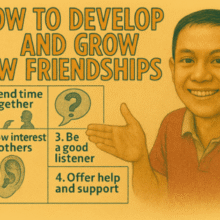Break Free From Your Need to be Codependent
Many codependents don’t even realize they’re codependent. Do you rely on your partner’s approval for a sense of self-worth and identity? If so, you might be codependent.
Here are some more signs:
- There is often extreme sacrifice to satisfy the needs of your partner.
- If you’re clingy or feel insufficient on your own, that’s another strong indicator you might be codependent.
- Constant anxiety is another sign of codependency.
Ask your friends if you’re too dependent in your relationships. If you’re codependent, it’s likely that they’ve noticed.
![Self-Reliance: Set Your Own Course and Take Charge of Your Life [Personal Development Blog Ebooks]](http://personaldevelopmentblog.net/wp-content/uploads/2018/07/Self-Reliance-560B.jpg)
Personal Development Blog Ebooks -OR-
This Ebook: Self-Reliance: Set Your Own Course and Take Charge of Your Life
Try these tips to reduce your need to be codependent:
1. Create an exciting and fulfilling life on your own. Build a life that you love. Think about the kind of life you’d like to have and begin building it. Avoid depending on someone else to build it for you.
- Make a list of the hobbies you most enjoy or would like to explore. Find others that can share in those activities.
- Join a community of people. It could be a church, club, or other type of organization. Have a group of people in your life. You’ll be less reliant on that one romantic relationship.
- Make regular plans with friends. It could be a standing date for dinner on Wednesday night or Saturday night bowling. Have regular face-to-face contact with your friends.
- Find a career that you find fulfilling. If you enjoy your job, you’ll be less likely to latch onto your partner.
- Volunteer. Show yourself that you have value outside of your relationship. Spend your time in a way that demonstrates you’re meaningful to the world.
- Develop yourself. Learn an instrument or other skill. Take a course. Get a part-time job doing something new. Go on an exotic trip.

About the Inspirational Poster by Beryl Markham
2. Create boundaries for any romantic relationship. Every relationship has boundaries. Whether you’re talking about a neighbor, lover, or spouse of 50 years, there are boundaries. Those that are codependent have weak or non-existent boundaries. Set up some reasonable limits for all of your relationships.
- Boundaries can include finances, communication, outside friendships and activities, and respecting differences.
3. Go slowly. With any new relationship, it can be prudent to move slowly. Remind yourself of the past issues you’ve had by becoming too dependent too soon. There’s no rush. You have all the time in the world for your relationship to proceed naturally and at a reasonable pace.
4. Maintain your identity. Those that are codependent lose themselves in their partner. Remind yourself that you’re a separate person. You still have your own preferences, personality, and identity. Maintain those things. You don’t have to melt into one big person with your partner. Be an original.

AD by Inspirational Media
5. Work on your feelings of self-worth. A lack of self-esteem is the core issue with many codependents. Working on your self-esteem is one of the best ways to spend your time. When you feel good about yourself, it’s easier to maintain a separate identity.
6. Get professional help. Studies show that most codependents were brought up in demanding households. As a child, the codependent learned to minimize their own needs in order to make a parent happy. This pattern repeats itself in future relationships. A deep-rooted issue like this may require professional assistance.
Codependency prevents you from living your life to the fullest. It’s a toxic relationship pattern that preys on low self-esteem and a need for approval.
You are a whole and complete person outside of any relationship. Learn to stand on your own by creating a supportive and interesting life. Make your self-esteem a priority. Find out who you really are and enjoy being you!
Featured Personal Development Ebook:
Those who participate in healthy romantic relationships leave clues from which the rest of us can learn. These clues serve as key principles that can promote growth and understanding between both you and your partner. These clues help determine how to build a thriving relationship.
Learn about the qualities of a healthy relationship in order to incorporate them into your partnership.
Cultivate a lasting and loving relationship with the principles mentioned in this ebook which are discussed into subtopics:
1. Grow Together, Not Apart
2. Rules of Engagement
3. Four Paths to Intimacy
4. Mixing Finances with Romances
5. Catch Life’s Curveballs
... and many more.
You will receive the file/s below (in one ZIP file) for your personal use:
1. For the Love of Love - Seven Principles for Fostering a Healthy Relationship
- Include Main Ebook (62-page PDF), Worksheet (8-page PDF), Checklist (5-page PDF) Bonuses!
2. 11 Ways to Practice Mindfulness Without Meditating
- Include 4-page PDF, Slide Deck (67-page PDF)
3. The Earnest Elephant Fable (4-page PDF)
View more gifts at PersonalDevelopment.




